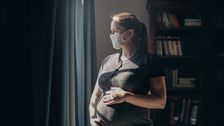News
When Should Pregnant Women Get The COVID-19 Vaccine?
Leading OB-GYNs recommend the COVID-19 vaccine for pregnant women (or those who are breastfeeding) if it is available to them, but expectant mothers understandably have a lot of questions.
One significant source of their confusion: Although the American College of Obstetricians and Gynecologists has said that the Pfizer or Moderna vaccine should be made available to any qualifying pregnant women, there haven’t actually been any studies done specifically in pregnant women yet. Also, the CDC has stopped short of a robust, universal recommendation, saying instead that COVID-19 vaccination during pregnancy is a “personal choice.”
The lack of data means there simply isn’t a lot of information about when pregnant women should get the vaccine, which is an important consideration for women who tend to follow a pretty clear, evidence-backed schedule during pregnancy in terms of prenatal visits, screening, shots and more.
Is it safer and more effective early in pregnancy? What about closer to a woman’s due date? Here are some considerations to keep in mind.
It’s not yet clear when the best time to get vaccinated might be.
Again, because there have not been clinical trials in pregnant women, there really is no good data about the safest or most effective timing at this point. Any thoughts health care providers have on the issue at this point are purely speculative.
But in general, “the first trimester is when fetal organs are forming and are most susceptible to damage,” explained Dr. Mark Payson, an OBGYN and practice director of CCRM Fertility Northern Virginia.
That’s why doctors and midwives tend to advise women to avoid non-essential medications in the first three months when possible.
“Based on this, it might seem reasonable to defer the vaccination to later in pregnancy,” Payson said.
But that “might” is key.
Because deferring vaccination until later in pregnancy also means a woman is at higher risk of COVID-19 infection earlier on — at a point when the virus could lead to complications for the growing fetus.
All of this means that at this point, it’s not really clear what timing is best.
For now, pregnant women should get vaccinated whenever they can.
If you’re pregnant and have decided to get the COVID-19 vaccine, the best course of action is probably just to do it whenever the shot is available to you, Payson said. The vaccine rollout has been slower than public health experts hoped, so there is no reason to wait if you’re in a qualifying group and if can score an appointment. (Experts recommend checking in on your local eligibility guidelines regularly, like once a week.) Basically, you don’t want to miss your chance.
Also, growing research suggests that pregnant women are at greater risk of severe illness if they become infected with COVID-19 at any stage of pregnancy, and that infection can also increase the risk of complications like preterm birth.
“The most rational answer at this point is to get vaccinated ASAP,” Payson argued. “Any theoretic risk of vaccination has to be balanced against the very real risk of an infection.”
There is growing evidence that pregnant women can pass on COVID-19 antibodies.
A recent study in the journal JAMA Pediatrics found that women who had COVID-19 antibodies because they’d been infected with the virus seemed to pass antibodies onto their babies through the placenta. There is also some suggestion from that study that women who were infected earlier on in their pregnancies seemed to pass on even higher levels of antibodies.
If women who contracted COVID-19 during pregnancy seem to pass on antibodies during pregnancy, it is reasonable to expect that women who are vaccinated against the virus while expecting might do so as well. (It’s why medical groups recommend pregnant women get vaccinated for the flu.) And doing so earlier on in pregnancy might confer more robust protection.
Again, so much of that research is relatively new, but it’s one bit of potential good news for women who are expecting as the pandemic wears on.
It is also definitely something women should talk to their health care providers about as they engage in conversations about COVID-19 vaccination and decide on the best course.
“The decision to get the vaccine while pregnant needs to be individualized based on the patient’s age, underlying medical conditions, and potential exposure to the virus,” Payson said. “Someone who can keep themselves in perfect isolation probably has little immediate need for the vaccination. However, for the vast majority of individuals, the known severe risk of a coronavirus infection outweighs the theoretic risk of a vaccination that has been shown to be extremely safe.”
Experts are still learning about COVID-19. The information in this story is what was known or available as of publication, but guidance can change as scientists discover more about the virus. Please check the Centers for Disease Control and Prevention for the most updated recommendations.
Read more

